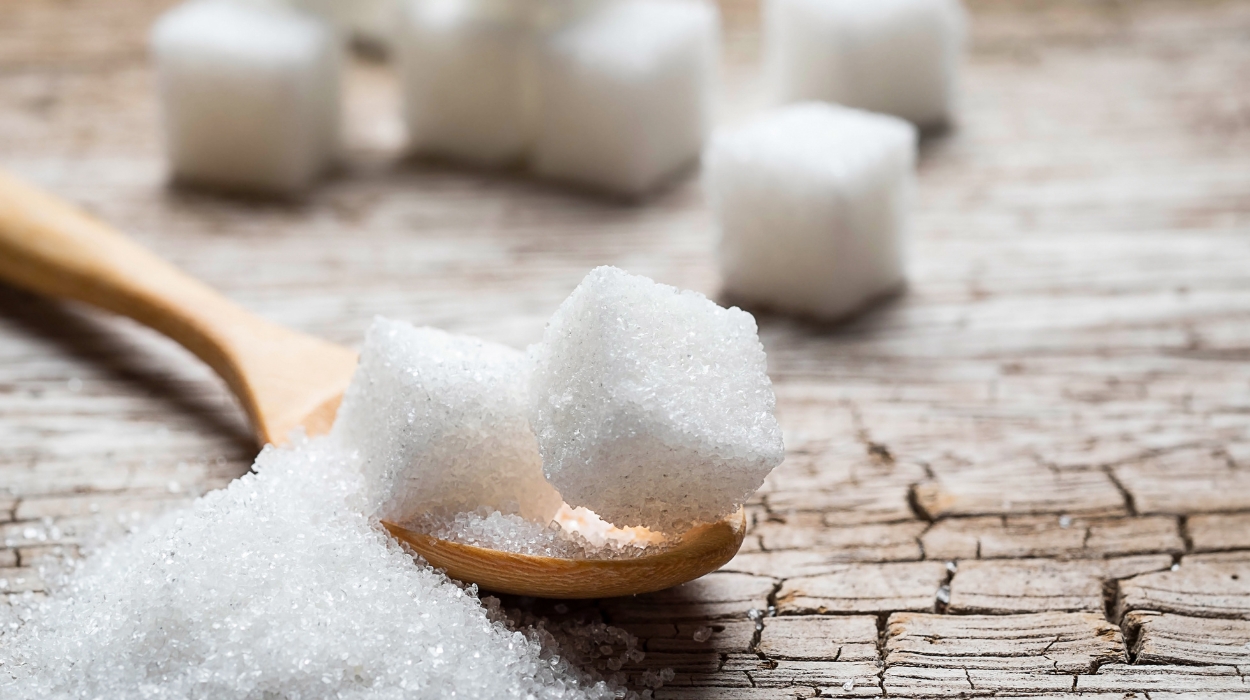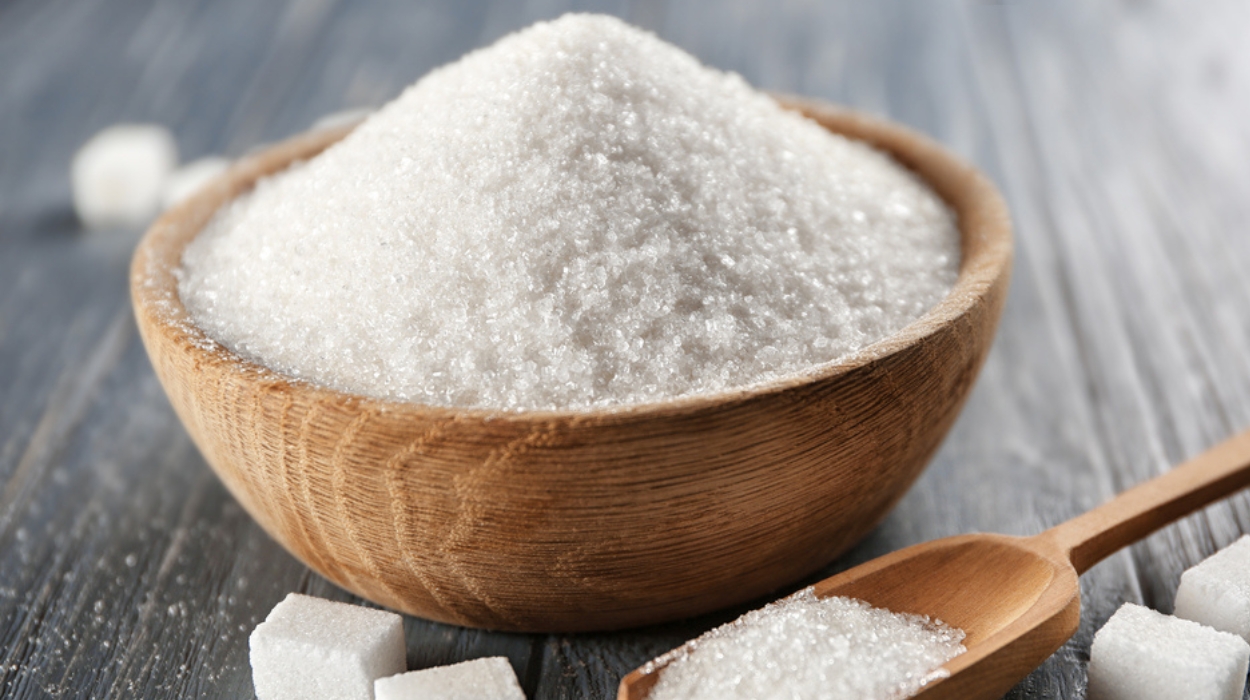People employ several measures to lose weight, and limiting your sugar intake is an important one. The American Heart Association reports that added sugars contribute only calories rather than nutritional value. This leads to weight gain and obesity.
Hence, it recommends no more than nine teaspoons (36 grams) and six teaspoons (25 grams)[1] of added sugar per day for men and women, respectively. To lose weight, you need to burn more calories than you consume. Thus, reducing your sugar intake can help you shed excess pounds.
In this article, we’ll be discussing how many grams of sugar per day is necessary to lose weight.
How Many Grams Of Sugar Per Day To Lose Weight?
There is no precise amount of sugar that one needs to eat per day to lose weight. However, it is important to note the following:
- Focus on sugar-containing, fiber-rich foods to lose weight.
- The slower you digest and absorb a certain food, the longer you feel full.
- These foods include whole grains, fruits, and vegetables.
- Refined carbohydrates and sugar get absorbed quickly, which can increase sugar levels and cause weight gain.
Overall, your healthcare provider is the best person to determine how much sugar you should consume daily if you want to lose weight.
How Much Sugar Per Day To Lose Weight?

There is no precise amount of sugar that one needs to eat per day to lose weight.
Experts suggest that focusing on low-sugar, fiber-rich foods can help you lose weight because they get digested and absorbed into the body slower and make you feel full for longer. On the other hand, refined carbohydrates and sugar get absorbed quickly and cause a sharp rise in sugar levels. This can, in turn, affect insulin sensitivity and result in weight gain.
Overall, your doctor or registered dietician is in the best position to determine how much sugar or carbs you should consume daily if you want to lose weight.
Safe Daily Sugar Intake
The World Health Organization recommends that adults consume no more than 50 grams[2] of sugar in a day and no more than 5% of their daily calories from added sugars.
The Dietary Guidelines for Americans go a little higher and recommend limiting your added sugar intake to less than 10% of your total daily calories.[3] This means that if your total calorie intake in a day is 2000 calories, no more than 200 calories (around 12 teaspoons/50 grams) should be from added sugars.
Finally, according to the American Heart Association, men and women should eat no more than nine teaspoons (36 grams) and six teaspoons (25 grams)[4] of added sugar per day, respectively.
Benefits Of Reducing Sugar
Cutting back on the amount of sugar in your diet accelerates your weight loss journey. It also boosts your immunity and reduces your risk of chronic diseases like diabetes, heart disease, dementia, Alzheimer’s disease, and cancer.
Reducing your sugar intake improves your mood, sleep quality, and dental health. You also avoid skin and hair problems like acne, hair loss, and other signs of early aging.
Risks Of Eating Too Much Sugar
Excessive consumption of refined carbs and sugar can increase inflammation in the body, increasing your risk of chronic diseases including type 2 diabetes, heart disease, high blood pressure, fatty liver disease, and cancer.
Increased sugar intake may also cause dental, skin, and hair problems, including tooth decay, acne, and early aging. You may feel fatigued and moody, and may experience headaches as well.
Tips To Cut Down On Sugar In Your Diet

Limiting sugar intake has several health benefits. Here are some tips on how to cut down on sugar in your diet, even if you have a sweet tooth:
Check Food Labels
Read through food product labels when shopping and look out for ingredients like[5] the following:
- Corn syrup.
- High fructose corn syrup.
- Glucose.
- Fructose.
- Dextrose.
- Lactose.
- Honey.
- Invert sugar.
- Corn sweetener.
- Maple syrup.
- Coconut sugar.
These are all added sugars manufacturers add to food products. A few are naturally occurring sugars and are not harmful in small amounts. However, you need to be careful, as one can consume excess sugar without realizing it. If a product has sugar listed among its first three ingredients or has more than one type of sugar, please avoid it.
Reduce Foods With Added Sugars
Reducing or totally avoiding certain foods with added sugars is a healthy way to limit your sugar quantity in your diet. According to the Dietary Guidelines for Americans 2015-2020,[6] foods that contain added sugars include sodas, energy drinks, sport drinks, candies, fruit drinks, cereal bars, and sweet snacks like cakes, brownies, cookies, pastries, and ice cream.
Avoid Processed Foods
Processed foods, like packaged and baked goods, are high in sugar and refined carbs. It’s best to opt for more natural foods, or better yet, cook at home.
Opt For Healthier Food Options
Substitute foods high in added sugars with healthier alternatives. You can consider replacing soda and sugary beverages with water flavored with fresh fruit or fruit juice. Eat fresh fruit for dessert instead of ice cream and pastries. Prioritize whole foods and low fat dairy products. Substitute sugar with unsweetened applesauce while baking.
Conclusion
Excessive sugar intake is linked to several health problems and chronic diseases. Hence, it is important to take note of how much sugar you are consuming. A good rule of thumb is to avoid foods with added sugars, especially those that list sugar as one of their first three ingredients.
Natural sugars found in whole foods, fruits, vegetables, and dairy are beneficial to your body. These food sources also contain nutrients, fiber, and water. Replacing added sugars with healthier, natural options can help you lose fat and maintain a healthy weight, even without exercise.
A healthy, balanced diet, drinking enough water, doing cardio and developing good lifestyle habits are important components of a weight loss strategy. Overall, our healthcare provider is in the best position to advise you on what to do to lose water weight and fat.
Frequently Asked Questions
Fruits contain natural sugars and do not count as added sugar. Natural sugars do not cause a sudden spike in insulin levels. For example, fructose in apples is considered a natural simple sugar.
Consuming excess sugar can cause a range of symptoms, including headaches, bloating, fatigue, irritability, feeling jittery, anxiety, increased cravings and hunger, diarrhea, and gas.
Lemon water does not flush out sugar or reduce blood sugar levels. Rather, it helps prevent spikes in blood sugar by slowing down sugar absorption into the bloodstream.[7]
The specific length of time it will take to detox from sugar varies from person to person. It depends largely on how much you are used to consuming foods with added sugar.
There is no precise amount of sugar to eat to lose weight. However, the WHO recommends that you take no more than 50 grams[2] of sugar daily and no more than 5% of your daily calories from added sugars.
Natural sugars are found in milk, fruits, and vegetables and are healthy. Eating these food sources comes with fiber and protein, which are important for weight loss. However, moderation is key to preventing weight gain.
High sugar consumption increases your calorie intake and has been linked to obesity and an increase in stress hormone – cortisol levels[8] which can increase belly fat. Limiting your added sugar intake can help you lose body fat, including hormonal belly fat.
Sugar increases your calories but adds no essential nutrients to your diet. Added sugars are digested quickly, increase hunger and your calorie intake, and make you gain weight. Usually, you need a calorie-deficit diet to lose weight.
 Expert's opinion
Expert's opinion
